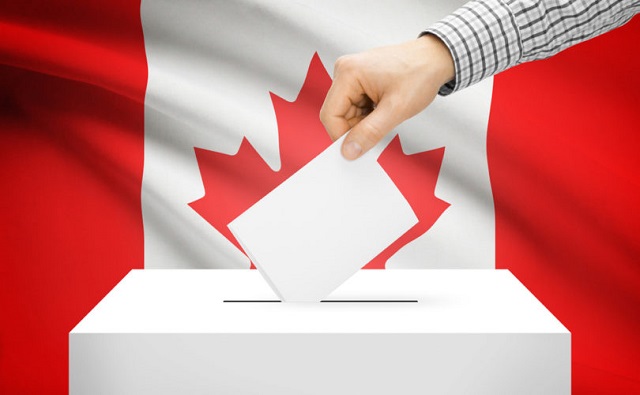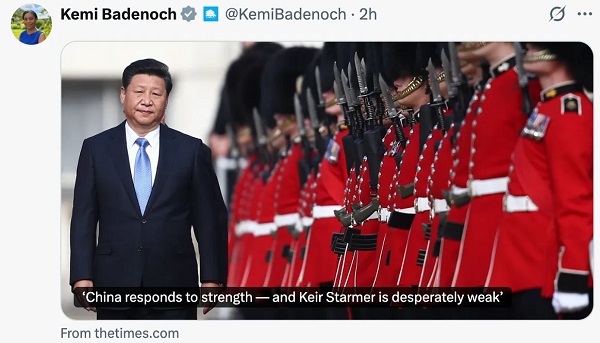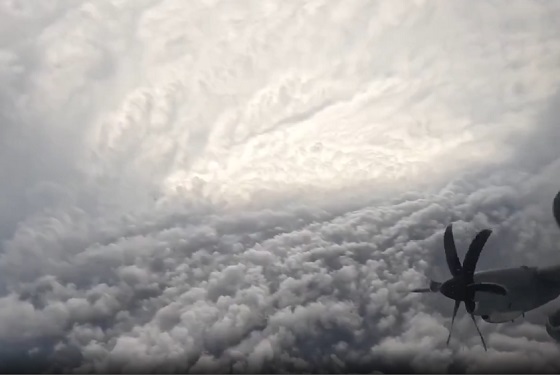espionage
Canadian election officials grilled over lack of focus on China, prosecution of Rebel News

From LifeSiteNews
When it comes to the CCP, many Canadians, especially pro-freedom Chinese Canadians, are concerned considering Trudeau’s past praise for China’s “basic dictatorship” and his labeling of the authoritarian nation as his favorite country other than his own.
Monitors for Canada’s federal elections admitted that despite getting hundreds of complaints claiming that agents of Communist China were interfering in the last two federal elections, it spent vast resources in a four-year chase against Rebel News for planting lawn signs promoting a book critical of Prime Minister Justin Trudeau during the 2019 election.
The admission was made earlier this week by Elections Commissioner Caroline Simard during the public inquiry being held to investigate alleged meddling in Canada’s two most recent federal elections by agents of the Chinese Communist Party (CCP), formally titled the Foreign Interference Commission.
Mylène Gigou, who serves as senior director of enforcement in the Office of the Elections Commissioner, testified that “Canada Elections Act is extremely, extremely complex,” adding that they all “work in a small team where we work very closely with legal counsel.”
Nando de Luca, counsel for the Conservative Party, asked if it would be fair to say, “For investigations of breaches of the Elections Act by domestic actors, the Office has allocated far greater resources and spent far more time in its enforcement activities than it has in respect of alleged breaches of the Act by foreign operators?”
“It is difficult to answer such questions,” replied Simard.
In June 2019, the federal government amended Canada’s Elections Act. The rules require that third parties, including non-profit groups, register with Elections Canada if they spend more than $500 on any kind of “political advertising.” This includes any spending that boosts positions taken during election campaigns regarding issues of public policy. The new Elections Act also sets spending limits on third-party election advertising.
During the fall 2019 Canadian federal election, Rebel News head Ezra Levant Levant was promoting his book, The Libranos: What the media won’t tell you about Justin Trudeau’s corruption, via posters, lawn signs, billboards, and other methods. While the Elections Act permits book promotions, the Commissioner ruled that the lawn signs were not a typical promotion and because Levant was not “registered” as a campaign actor, his action was a violation of the rules.
As a result, Levant was fined $3,000 by the Commissioner, a decision which was upheld by a federal judge last December.
Conservatives question why feds used vast resources to target Rebel News
During the public inquiry this week, de Luca questioned why the Elections Commissioner went after Rebel News so strongly, while at the same time a massive number of complaints concerning CCP interference went un-investigated.
“We are talking about a period of well over four years that the Office of the Commissioner of Elections devoted expenses and resources to this one particular instance of contravention of the Elections Act,” said de Luca.
Now-retired Elections Commissioner Yves Côté, who was the one who green-lit the Rebel News prosecution, said, “I have no specific recollection.”
“The link with foreign interference is not apparent to me for the time being,” said Côté. “What you are saying about this case, I don’t see foreign interference at all in the picture. That said, yes, there was an administrative monetary penalty against Rebel News.”
The Foreign Interference Commission began on January 29 and “will examine and assess the interference by China, Russia and other foreign states or non-state actors, including any potential impacts, in order to confirm the integrity of, and any impacts on, the 43rd and 44th general elections (2019 and 2021 elections) at the national and electoral district levels.”
The inquiry is being headed by Justice Marie-Josée Hogue, who had earlier said that she and her lawyers will remain “impartial” and will not be influenced by politics throughout the process.
In January, Hogue said that she would “uncover the truth whatever it may be.”
“The role of a Commission of Inquiry is to investigate the facts in order to understand what happened in a given situation. Under its mandate, it carries out an objective search of the truth while identifying specific matters, draws conclusions and make recommendations to the government,” she said.
The first set of hearings, or “Stage 1,” are taking place from now until April 10, and will include a host of witnesses including Prime Minister Justin Trudeau.
The “Stage 2” part of the public inquiry will take place this fall and will look at the Trudeau government’s ability to both detect and fight foreign interference targeting Canada’s electoral processes.
The hearings are being held at the Library and Archives Canada building in Ottawa.
When it comes to the CCP, many Canadians, especially pro-freedom Chinese Canadians, are concerned considering Trudeau’s past praise for China’s “basic dictatorship” and his labeling of the authoritarian nation as his favorite country other than his own.
The potential meddling in Canada’s elections by agents of the CCP has many Canadians worried as well.
The public inquiry comes after Trudeau launched a failed investigation into CCP allegations last year after much delay. That inquiry was not done in the public and was headed by “family friend” and former Governor General David Johnston, whom Trudeau appointed as “independent special rapporteur.”
Johnston quit as “special rapporteur” after a public outcry following his conclusion that there should not be a public inquiry into the matter. Conservative MPs demanded Johnston be replaced over his ties to both China and the Trudeau family.
espionage
“Suitcase of Cash” and Secret Meeting Deepen Britain’s Beijing Espionage Crisis

Britain’s most consequential espionage scandal in a generation has narrowed on Keir Starmer’s inner cabinet after The Sunday Times revealed that alleged Chinese agent Christopher Berry was intercepted at Heathrow Airport with a “suitcase full of cash” — and that senior officials, including National Security Adviser Jonathan Powell and Cabinet Secretary Christopher Wormald, held a closed-door meeting, allegedly discussing that advancing the case would harm relations with Beijing, weeks before prosecutors abandoned the insider-threat file.
The revelations, combined with an explosive Opposition letter from Kemi Badenoch and a rare diplomatic intervention from Washington, have plunged Prime Minister Keir Starmer’s government into the most serious national-security controversy of its tenure — one now shaking both Westminster and the Five Eyes intelligence alliance. Not since the Kim Philby affair and the exposure of the Cambridge Spy Ring has a British government been so roiled by allegations of insider compromise and appeasement toward a hostile foreign state.
As The Sunday Times reported, Christopher Berry — a 33-year-old academic from Oxfordshire — was stopped under the Terrorism and Border Security Act after a February 2023 flight from China. Police seized £4,000 in cash, believed to have been supplied by his Chinese handler, codenamed “Alex,” linked to the Ministry of State Security.
A witness statement tabled in Parliament last week indicated that Berry funnelled real-time political intelligence through his MSS handler to one of Beijing’s senior leaders, all collected from a former Chinese teaching colleague — a Parliamentary researcher with deep access to senior Conservative MPs. Beijing reportedly viewed those MPs as a strategic threat, fearing that if they rose to higher office they would adopt a far stricter stance toward China’s geopolitical ambitions.
Though Berry was not detained at the time, the incident became central to the espionage case later dropped by the Crown Prosecution Service when the Starmer government declined to certify that China posed an “ongoing threat to national security” — a legal requirement under the Official Secrets Act.
The Sunday Times also revealed that Deputy National Security Adviser Matthew Collins, the government’s sole witness, privately acknowledged that the decision not to describe China as an “ongoing threat” was “political.” The paper further disclosed that Jonathan Powell — a former banking executive who rose to become Starmer’s National Security Adviser — chaired a meeting on September 1 attended by Cabinet Secretary Christopher Wormald and MI5 Director-General Sir Ken McCallum, in which “the general theme of discussion was how the UK’s relationship with China was going to be damaged by this case.”
If accurate, that account directly contradicts Starmer’s assurance to Parliament that “no minister or special adviser was involved.” The implication — that Britain’s most senior national-security officials were weighing diplomatic consequences while an active espionage prosecution was still underway — has intensified accusations that the case was derailed by political interference rather than evidentiary weakness.
Within hours of the Sunday Times story, Opposition Leader Kemi Badenoch posted a letter to X accusing Keir Starmer of misleading Parliament and concealing ministerial involvement in the case’s collapse.
Framing the letter, Badenoch sought to explain the rapidly evolving affair to a wider audience. “I don’t blame you if you’ve struggled to follow the China spying case engulfing Parliament. Even MPs are finding it hard to keep up with a story that seems to change by the hour,” she wrote. “I suspect many fair-minded people have assumed this story can’t contain much. It seems too implausible for the government to have deliberately let off people who were accused of spying on MPs. But the story is truly astonishing. The layers of it have unravelled over the past few weeks like something from a spy novel.”
In the letter itself, Badenoch demands full disclosure of all correspondence, meetings, and witness-statement revisions involving Jonathan Powell, the Attorney General, or the Cabinet Office. She references the Sunday Times account directly, noting that “Powell left attendees with the understanding that Deputy National Security Adviser Collins’s witness statement would operate within the language of the report,” implying foreknowledge and coordination between Downing Street and prosecutors. She further alleges that Starmer’s ministers “softened” later witness statements to downplay Chinese espionage, replacing hard intelligence assessments with diplomatic phrasing designed to reassure Beijing. Her conclusion is cutting: “You have shown Britain is weak in the face of espionage, and have emboldened our enemies to believe they can spy on us with impunity.”
As reported previously by The Bureau, the controversy has now drawn international concern. The Chair of the U.S. House Select Committee on the Chinese Communist Party, John Moolenaar, has issued an extraordinary public rebuke on the court matter — a move almost without precedent between close allies. In a two-page letter dated October 16, 2025, addressed to James Roscoe, chargé d’affaires at the British Embassy in Washington, Moolenaar warned that Britain’s decision to abandon the prosecution risked setting “a dangerous precedent that foreign adversaries can target democratically elected legislators with impunity.” He wrote that the decision “deeply troubles” U.S. lawmakers and “undermines Five Eyes security coordination,” given the substantial amount of evidence against Berry and Christopher Cash, who were accused of funnelling parliamentary intelligence to the Chinese Communist Party.
“I hope the UK government will not allow this case to falter,” Moolenaar said, “and will instead take the steps necessary to ensure that both justice and due process are served.”
The letter, co-signed by senior members of the Committee and publicly released by Congress, marks an exceptional public intervention in a live national-security case involving a Five Eyes partner. Moolenaar added that the decision to drop the prosecution — despite evidence confirming a direct intelligence channel from Westminster to Beijing — “paints a concerning picture,” noting the resumption of high-level UK–China trade talks, negotiations over China’s proposed “super embassy” in London, and London’s ongoing review of its diplomatic posture toward Beijing. “Allowing this PRC aggression to go unchecked,” he warned, “would only incentivize the CCP to further interfere in Western democracies.”
As The Bureau previously detailed, Matthew Collins’s witness statement traced an intelligence pipeline connecting Westminster directly to Beijing’s leadership. Berry, via his handler “Alex,” transmitted reports obtained from Christopher Cash, a parliamentary aide with access to Conservative MPs critical of Beijing. Collins confirmed that some of the same intelligence later appeared in the possession of a senior CCP Politburo Standing Committee member — reportedly Cai Qi, one of Xi Jinping’s closest allies. Collins also documented Beijing’s targeted inquiries into the 2022 Conservative leadership race, focusing on Tom Tugendhat and Neil O’Brien, both members of the China Research Group (CRG) and long-standing critics of the CCP.
Taken together, the Heathrow cash seizure, the Powell-chaired meeting, the Badenoch letter, and the U.S. congressional intervention point to a modern Cold War crisis — a confrontation that has now moved beyond Westminster to test the cohesion of the Western alliance itself.
The Bureau is a reader-supported publication.
To receive new posts and support my work, consider becoming a free or paid subscriber.
espionage
Breaking: P.E.I. Urges RCMP Probe of Alleged Foreign Interference, Money Laundering

The Great Enlightment Buddhist Academy, PEI
Prince Edward Island’s government has formally asked the RCMP to investigate allegations of foreign interference and money laundering tied to Buddhist-affiliated organizations operating in the province — an escalation that follows The Bureau’s reporting and last week’s press conference on Parliament Hill calling for a federal public inquiry.
In a letter sent today to RCMP Commissioner Michael Duheme, Premier Rob Lantz and Minister of Housing Cory Deagle urge federal authorities to “review any evidence available, engage with the individuals who have made these claims, and conduct an investigation into any wrongdoing.” A companion letter was sent to FINTRAC, asking Canada’s financial intelligence unit to assess whether regulatory action is warranted.
The government move comes a week after The Bureau reported on findings presented at an October 8 news conference tied to the book Canada Under Siege: How P.E.I. Became a Forward Operating Base for the Chinese Communist Party.
In a following op-ed, co-author Garry Clement said the press conference had “set down a marker: Canada has entered a new era of contestation — over influence, sovereignty, and the integrity of its democratic institutions.” In related coverage by CBC, representatives of the religious groups have denied any links to the Chinese Communist Party or any improper dealings.
Clement and co-authors argued that the allegations demand “action, reform, and reckoning,” and called for a federal public inquiry with full powers — an appeal joined by former Solicitor General and long-time P.E.I. MP Wayne Easter, who urged an inquiry capable of compelling testimony and documents.
The Bureau also revealed a development that stunned Islanders: a response subpoenaed by P.E.I. lawmakers showed that an anticipated 2016–2018 Island Regulatory and Appeals Commission (IRAC) investigation into Buddhist-linked land holdings was never completed. A January 26, 2018 letter from IRAC’s appointed counsel notified firms representing the groups that the section 15 probe “has ended,” without public findings or any explanation of who ordered the closure or why. The disclosure raised fresh questions about oversight and potential conflicts, and now forms part of the backdrop to the province’s formal request for federal action.
The Bureau contacted IRAC last week with questions related to the agency’s management, including counsel relationships and prior positions within P.E.I. legal networks. New developments on this breaking story will be reported.
Today’s letter to RCMP Commissioner Duheme from the P.E.I. government explicitly references the October 8 statements by a former Solicitor General of Canada and a former RCMP Superintendent, noting it was “suggested that information exists that could provide grounds for a criminal investigation.” The Premier further flags assertions that P.E.I. has been used as “a forward operating base for the Chinese Communist Party,” calling the claim “serious” and stating it must be examined by federal agencies to determine whether any factual basis exists.
The province also points to what it describes as a newly mandated and ongoing investigation by IRAC into land holdings “associated with some of the same entities referenced in the public allegations,” using powers expanded in 2022 under the Lands Protection Act. Any findings with criminal or national-security implications, the letter says, will be referred to federal authorities.
The Bureau is a reader-supported publication.
To receive new posts and support my work, consider becoming a free or paid subscriber.
-

 Business2 days ago
Business2 days agoYou Won’t Believe What Canada’s Embassy in Brazil Has Been Up To
-

 Censorship Industrial Complex2 days ago
Censorship Industrial Complex2 days agoSenate Grills Meta and Google Over Biden Administration’s Role in COVID-Era Content Censorship
-

 Business2 days ago
Business2 days agoMystery cloaks Doug Ford’s funding of media through Ontario advertising subsidy
-

 Environment2 days ago
Environment2 days agoThe era of Climate Change Alarmism is over
-

 Automotive2 days ago
Automotive2 days agoCarney’s Budget Risks Another Costly EV Bet
-

 Crime1 day ago
Crime1 day agoPublic Execution of Anti-Cartel Mayor in Michoacán Prompts U.S. Offer to Intervene Against Cartels
-

 Aristotle Foundation1 day ago
Aristotle Foundation1 day agoB.C. government laid groundwork for turning private property into Aboriginal land
-

 Justice1 day ago
Justice1 day agoA Justice System That Hates Punishment Can’t Protect the Innocent













